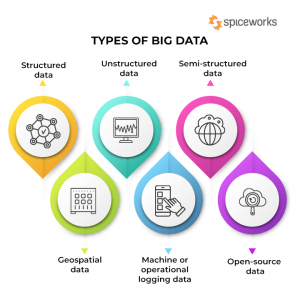Unlike regular data, “big data” is used to refer to large scale of data available that has yet to be sorted through. Data has been arriving in increasing volumes and with more velocity, with over 90% of all data ever having been created in the last 3 years, and big data refers to the overarching amount of data available in different and sometimes incompatible forms. “Data” on the other hand, is information that has been sorted and translated into a form that is efficient for movement or processing.
 Companies use Big Data to gain insight and collect information in order to improve operations, provide better customer service, create personalized marketing campaigns and take other actions that, ultimately, increase revenue and profits. As Big Data continues to grow at an exponential rate, I can it being difficult to manage due to humans not being able to sort it as fast as it is coming in. This is where computing systems and AI can become especially important—computers are much more equipped to sort through information for key details at faster speeds than humans. Furthermore, in order to achieve deep learning (a machine learning technique that teaches computers to do what comes naturally to humans), big data is necessary to isolate hidden patterns and to find answers without overfitting the data.
Companies use Big Data to gain insight and collect information in order to improve operations, provide better customer service, create personalized marketing campaigns and take other actions that, ultimately, increase revenue and profits. As Big Data continues to grow at an exponential rate, I can it being difficult to manage due to humans not being able to sort it as fast as it is coming in. This is where computing systems and AI can become especially important—computers are much more equipped to sort through information for key details at faster speeds than humans. Furthermore, in order to achieve deep learning (a machine learning technique that teaches computers to do what comes naturally to humans), big data is necessary to isolate hidden patterns and to find answers without overfitting the data.
Leave a Reply
You must be logged in to post a comment.